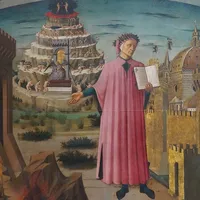Canto XIV
Poi che la carita` del natio loco mi strinse, raunai le fronde sparte, e rendèle a colui, ch'era gia` fioco. Indi venimmo al fine ove si parte lo secondo giron dal terzo, e dove si vede di giustizia orribil arte.
A ben manifestar le cose nove, dico che arrivammo ad una landa che dal suo letto ogne pianta rimove.
La dolorosa selva l'e` ghirlanda intorno, come 'l fosso tristo ad essa: quivi fermammo i passi a randa a randa. Lo spazzo era una rena arida e spessa, non d'altra foggia fatta che colei che fu da' pie` di Caton gia` soppressa. O vendetta di Dio, quanto tu dei esser temuta da ciascun che legge cio` che fu manifesto a li occhi miei!
D'anime nude vidi molte gregge che piangean tutte assai miseramente, e parea posta lor diversa legge. Supin giacea in terra alcuna gente, alcuna si sedea tutta raccolta, e altra andava continuamente.
Quella che giva intorno era piu` molta, e quella men che giacea al tormento, ma piu` al duolo avea la lingua sciolta.
Sovra tutto 'l sabbion, d'un cader lento, piovean di foco dilatate falde, come di neve in alpe sanza vento. Quali Alessandro in quelle parti calde d'India vide sopra 'l suo stuolo fiamme cadere infino a terra salde, per ch'ei provide a scalpitar lo suolo con le sue schiere, accio` che lo vapore mei si stingueva mentre ch'era solo: tale scendeva l'etternale ardore; onde la rena s'accendea, com'esca sotto focile, a doppiar lo dolore. Sanza riposo mai era la tresca de le misere mani, or quindi or quinci escotendo da sè l'arsura fresca. I' cominciai: «Maestro, tu che vinci tutte le cose, fuor che ' demon duri ch'a l'intrar de la porta incontra uscinci, chi e` quel grande che non par che curi lo 'ncendio e giace dispettoso e torto, si` che la pioggia non par che 'l marturi?». E quel medesmo, che si fu accorto ch'io domandava il mio duca di lui, grido`: «Qual io fui vivo, tal son morto. Se Giove stanchi 'l suo fabbro da cui crucciato prese la folgore aguta onde l'ultimo di` percosso fui; o s'elli stanchi li altri a muta a muta in Mongibello a la focina negra, chiamando "Buon Vulcano, aiuta, aiuta! ", si` com'el fece a la pugna di Flegra, e me saetti con tutta sua forza, non ne potrebbe aver vendetta allegra». Allora il duca mio parlo` di forza tanto, ch'i' non l'avea si` forte udito: «O Capaneo, in cio` che non s'ammorza la tua superbia, sè tu piu` punito: nullo martiro, fuor che la tua rabbia, sarebbe al tuo furor dolor compito».
Poi si rivolse a me con miglior labbia dicendo: «Quei fu l'un d'i sette regi ch'assiser Tebe; ed ebbe e par ch'elli abbia Dio in disdegno, e poco par che 'l pregi; ma, com'io dissi lui, li suoi dispetti sono al suo petto assai debiti fregi. Or mi vien dietro, e guarda che non metti, ancor, li piedi ne la rena arsiccia; ma sempre al bosco tien li piedi stretti».
Tacendo divenimmo la` 've spiccia fuor de la selva un picciol fiumicello, lo cui rossore ancor mi raccapriccia. Quale del Bulicame esce ruscello che parton poi tra lor le peccatrici, tal per la rena giu` sen giva quello.
Lo fondo suo e ambo le pendici fatt'era 'n pietra, e ' margini dallato; per ch'io m'accorsi che 'l passo era lici. «Tra tutto l'altro ch'i' t'ho dimostrato, poscia che noi intrammo per la porta lo cui sogliare a nessuno e` negato, cosa non fu da li tuoi occhi scorta notabile com'e` 'l presente rio, che sovra sè tutte fiammelle ammorta». Queste parole fuor del duca mio; per ch'io 'l pregai che mi largisse 'l pasto di cui largito m'avea il disio. «In mezzo mar siede un paese guasto», diss'elli allora, «che s'appella Creta, sotto 'l cui rege fu gia` 'l mondo casto. Una montagna v'e` che gia` fu lieta d'acqua e di fronde, che si chiamo` Ida: or e` diserta come cosa vieta. Rea la scelse gia` per cuna fida del suo figliuolo, e per celarlo meglio, quando piangea, vi facea far le grida.
Dentro dal monte sta dritto un gran veglio, che tien volte le spalle inver' Dammiata e Roma guarda come suo speglio. La sua testa e` di fin oro formata, e puro argento son le braccia e 'l petto, poi e` di rame infino a la forcata; da indi in giuso e` tutto ferro eletto, salvo che 'l destro piede e` terra cotta; e sta 'n su quel piu` che 'n su l'altro, eretto. Ciascuna parte, fuor che l'oro, e` rotta d'una fessura che lagrime goccia, le quali, accolte, foran quella grotta. Lor corso in questa valle si diroccia: fanno Acheronte, Stige e Flegetonta; poi sen van giu` per questa stretta doccia
infin, la` ove piu` non si dismonta fanno Cocito; e qual sia quello stagno tu lo vedrai, pero` qui non si conta».
E io a lui: «Se 'l presente rigagno si diriva cosi` dal nostro mondo, perchè ci appar pur a questo vivagno?». Ed elli a me: «Tu sai che 'l loco e` tondo; e tutto che tu sie venuto molto, pur a sinistra, giu` calando al fondo, non sè ancor per tutto il cerchio volto: per che, se cosa n'apparisce nova, non dè addur maraviglia al tuo volto». E io ancor: «Maestro, ove si trova Flegetonta e Lete`? chè de l'un taci, e l'altro di' che si fa d'esta piova». «In tutte tue question certo mi piaci», rispuose; «ma 'l bollor de l'acqua rossa dovea ben solver l'una che tu faci. Lete` vedrai, ma fuor di questa fossa, la` dove vanno l'anime a lavarsi quando la colpa pentuta e` rimossa». Poi disse: «Omai e` tempo da scostarsi dal bosco; fa che di retro a me vegne: li margini fan via, che non son arsi,
e sopra loro ogne vapor si spegne».

